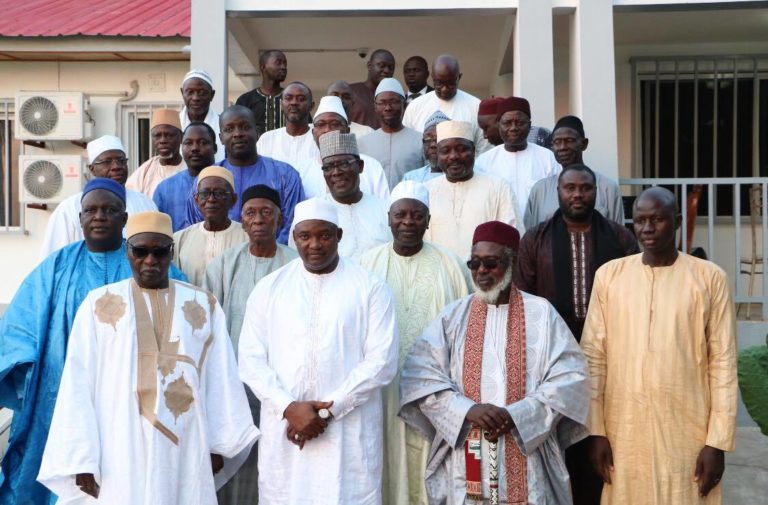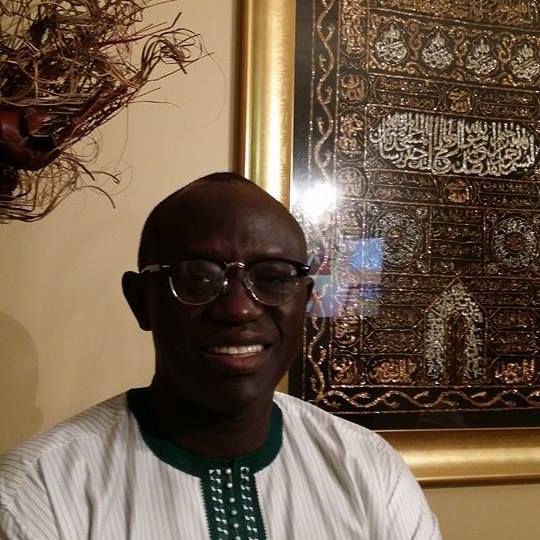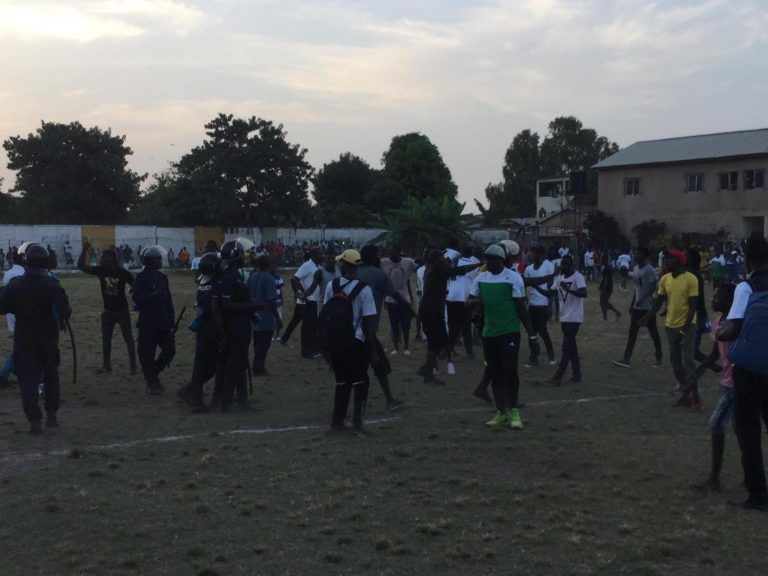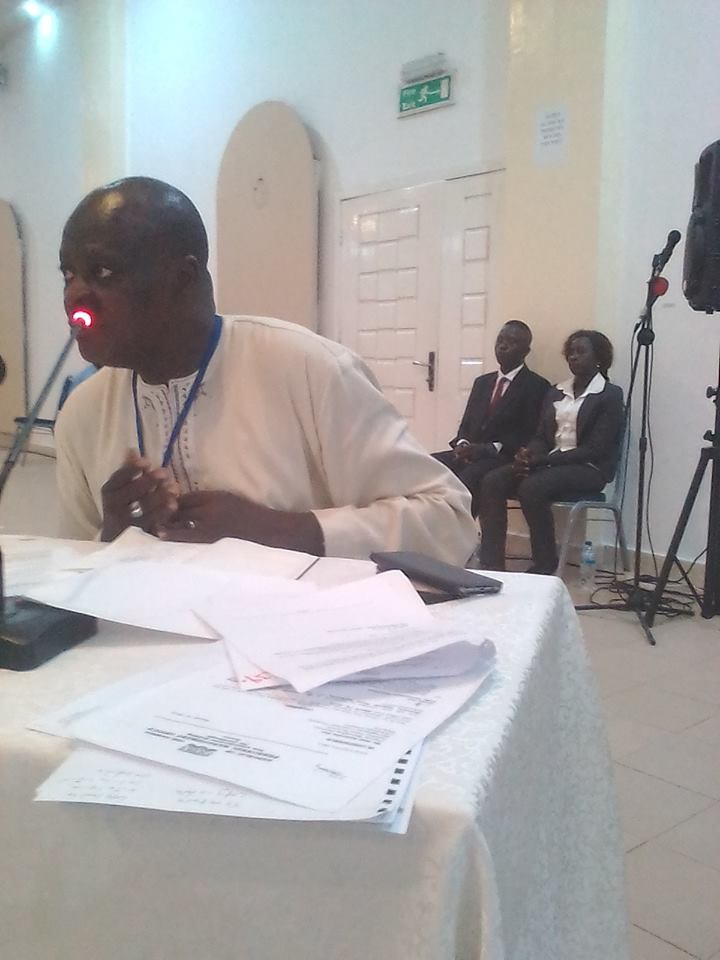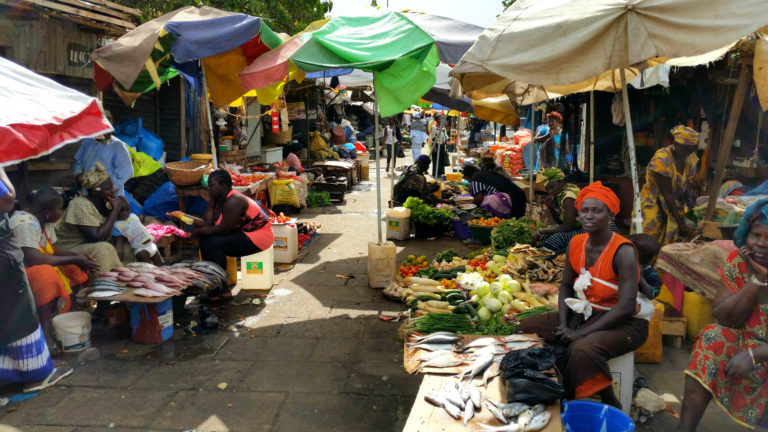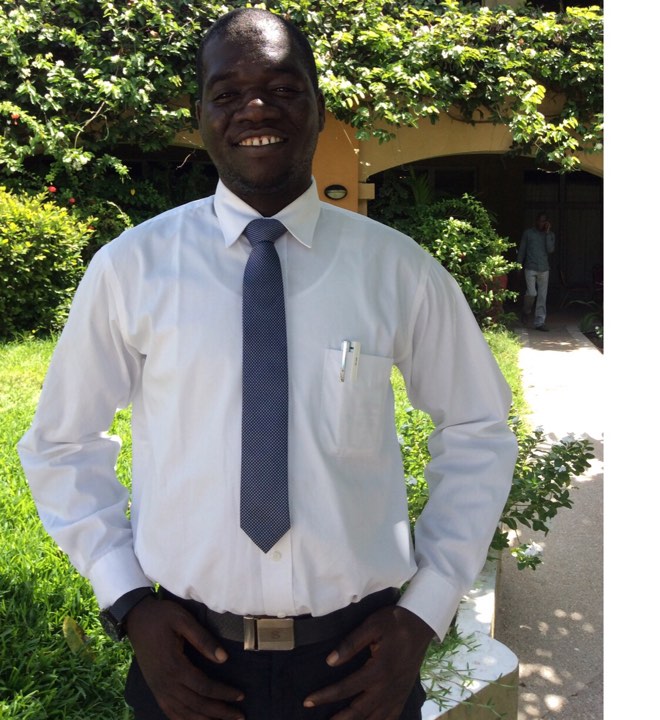Khalipha of the Tidiania calls for peaceful co-existence, unity and solidarity
The Irony of the WhatsApp tool that gave us our freedom
WhatsApp became the tool that galvanized us as a people, and the final nail in the coffin of the Jammeh tyranny. The WhatsApp tool became the nexus for Gambians living in small villages and hamlets to Gambians living in the Diaspora, as we shared the platform to remind all of us the need to come together and bring sanity to our homeland. We were tired of the fear, disappearances, impunity, and the realization that our Gambia was off the cliff of becoming a failed state. The Diaspora was seen by our folks back home as the enlightened sons and daughters who are only driven by love of country, and irrespective of our partisan divide and whatever perceived difference we may have, there is a known truth that we will never engaged in processes that will threaten the stability of our country. The irony of it all is that the WhatsApp, the tool touted by president Barrow wherever he goes as the most effective tool that finally brought down the Jammeh tyranny and gave us our freedom, is now seen to be threatening and poised to put us back in the path of self-destruction
I am sure some of my good friends will find the above statements leaning close to rhetorical hyperbole, but after twenty-two years of what we went through as a country, taking things for granted should be avoided at all cost. During the last twenty some years, I have met folks from the UDP, PDOIS, NRP, PPP and non- partisans, and I am absolutely certain and convinced that the majority will never engaged in some of the ugly rhetoric being spewed through the WhatsApp tool. Like most people, I do not believe these folks speak for any singly party or party leader for that matter, and I have to assume that whoever wants to become president eventually, you would want to be a president of a country and a stable country for that matter. These dangerous minority can and will never help anyone become president, or to build a country that all of us can be proud of.
It is important for the good people and leaders of the struggle that made the sacrifices and the inconveniences over the years, not to allow their focus for partisan successes only to capitulate to these small minority of dangerous folks spewing hate and ready to highjack our successes. Let us all work together and remind every Gambian that we can have our political differences, but that’s just what they are because ultimately the preservation of our country and all our people is the most important goal. Heated and contentious debates and discussions are part of pluralistic democracy, especially at its infancy, and I can understand, but when it transitions to something outside the norms and values that we fought for as a people, together we should repudiate and lean on our leaders to do the same. It is too early to destroy the very work we have engaged in for the past twenty some years, just because….
Musa Jeng
The Gambia receives three new ambassadors
Police Fire Tear Gas at Supporters
By Alieu Ceesay
Gambian police used tear gas to disperse angry football supporters on Tuesday during a quarter final game in the country’s most watched local football competition.

The game between SK East and Bakau ended with SK East defeating Bakau 1-0 in a derby game. Alder Mendy scored the all-important goal in the second half.
The Super Nawettan or better known as Zonal is an annual football competition competed among recognized zones.
It was a derby encounter and the two sides had a long history of rivalry. The final whistle was the end of the game, but the start to a fight between the supporters as they threw any object they can lay their hands on.
The incident saw fans causing damage to the perimeter fence and chairs at the park. There was no major injury reported at the time of going to press, but one journalist was left suffocated by the tear gas.
In the other quarter final game, Gunjur won Kombo East at the Box Bar Mini Stadium. The Super Nawettan Organising Committee Chaired by former Army General Lang Tombong Tamba is expected to sit on the matter and come up with appropriate sanctions.
APRC Prepares For A 50,000 Man Rally
By Omar Wally
The Opposition Alliance for Patriotic Reorientation and Construction (APRC) party will on Saturday, October 28, 2017, hold a 50,000 man rally.
In an interview with The Fatu Network, Yankuba Colley, Mayor of The Kanifing Municipal Council who doubled as the party mobilizer said the event which will be held at the Buffer-zone, will be the first biggest rally the APRC will hold since the departure of its leader, former president, Yahya Jammeh.
“The rally will bring our supporters together as usual and to implore on them to continue supporting the party. We want to also show that The APRC is still existing and is stronger than ever.”

He said the 50,000 man rally will be a success adding that they have already sold fifty bales of ‘Asobi’ and that more people are still coming forward to buy.

The rally he said will be a proof to those who think The APRC party is on life support. “ Even though our assets have been frozen, we are still existing” He concluded.
We were used as experiments — Jammeh’s HIV patients
The HIV/AID patients of Yahya Jammeh are initiating a legal action against the former ruler as victims of his 22-year rule join hands to secure his extradition from Equatorial Guinea and eventual prosecution.
Ousman Sowe, a patient in Jammeh’s first batch of “alternative treatment”, has said they were used as lab rats and only given a consent form after several doses were administered.
“As patients we have the right to consent to any form of treatment, which we were denied… Realizing that mishap, they came retrospectively trying to get us to sign consent forms under some form of duress,” Sowe said.
“Because there were armed soldiers around us and knowing the kind of regime we were all familiar with, no one can say no. We have been subjected to various kinds to human rights abuses.”
Sowe and three of his other colleagues were at Kairaba over the weekend to join a coalition of civil society activists, international lawyers and rights organizations who launched a campaign to bring Jammeh to justice.
Jammeh said his cocktail of traditional medicine works and his claims were supported by some mainstream doctors, some of whom are still practicing in the country.
Jammeh, accused to have committed series of crimes including crimes against humanity, torture and disappearances, fled to Equatorial Guinea following his December election defeat by President Adama Barrow.
The HIV patients who have come out to speak about their alleged abuses under Jammeh have joined over 400 other victims, some of whom have lost their relatives like the Sandeng family.
The HIV patients are being aided legally by the AIDS Free World. “Our human rights were violated during our stay under the treatment from January 2007 to July 2007,” Sowe said.
The victims that gave their testimonies were Imam Baba Leigh, Amadou Scattred Janneh, Nana-Jo N’dow and Ayeesha Jammeh. Dr Janneh said they will ensure that they the cost for Equatorial Guinea for Keeping Jammeh.
Source: Standard Newspaper
POLICE DENY TARGETING OPPOSITION LEADERS
The Gambia Police Force has categorically denied targeting opposition politicians for harassment stressing that the recent questioning of the APRC and GDC leaders had nothing to do with politics.
In the last few months, the police drew criticisms from both parties after they invited Fabakary Tombong Jatta of the APRC and Mamma Kandeh of the GDC, allegedly over remarks they made on the political platform.
However speaking to The Standard Police Public Relations Officer ASP Foday Conta said the arrest of the two political leaders was not politically motivated and was not also based on any executive directive.
“Let me make it very clear that the GPF has never arrested or questioned anybody for political reasons since January 19.
The recent questioning of the two opposition leaders was not because they are party leaders but it was because they made some allegations that were contrary to the law. For example Kandeh made allegations against the Coalition government, accusing them of diverting funds. We felt it is necessary to invite him to verify the information so that we can open a case file for investigation but he did not tell us anything,” Conta stated.
On Fabakary Tombong Jatta, ASP Conta said: ‘You cannot use your political platform to incite violence. The interim leader of APRC was questioned and warned seriously after which he was released”.
On the case of Lamin Manneh, AKA Njie Manneh, who recently claimed in a WhatsApp message shared on the UDP forum he shot someone in the leg at Buffer-Zone, Conta said Njie Manneh never shot anyone.
“He lied to the public by claiming to have shot someone in the leg but told the police during his interrogation that he was just trying to scare off people, who threatened to kill him upon his return to the Gambia. He resorted to communicating false threats and information in an attempt to scare off people he perceived wanted to hurt him,” the police spokesman said.
The police, he said, are doing their job independently as it is here for everybody and protecting the peace and stability if the country at all times.
Source: Standard Newspaper
Gambia’s divisive and usurper political force
By Lamin Comma
It is obvious to many that the Gambia is at a crossroads and many of my colleague political commentators and politicians have attested to this fact. What is not sufficiently addressed and not unanimously consented to the many dangers that fraught this crossroad in Gambian history. Who is responsible for the chaos, coalition intransigence and resulting public disputes that never once serve the public INTEREST? We all know the saying “those who do not have the capacity to learn from history, are bound to repeat its pitfalls. This is quite frankly looking more likely to be our fate if well-meaning citizens from all sides of the political divide cannot come together to counter this looming political threat that can have security and socio-economic implications for ‘New Gambia’.
The coalition needs visionary, unambiguous and decisive leadership that is not just independent (not favoring any single one of the coalition parties) and devoid of political bias… but is seen to be independent and democratic. What we have seen and the last outburst against Hon. Halifa Sallah being a prime example is a Presidency that is discombobulated and a confused. This is very much symptomatic of an unprepared, untested and an accidental leader that is not really in control. What we have is a reactionary leadership, an underling that is at the mercy of a usurper political god-father.
For months, I have been lamenting on the divisiveness and attempted usurpation of our new political reality. A reality that came about as a result of years and in some cases decades of sacrifice by many Gambians and some non-Gambians. Despite the difference in the level of sacrifice from one victim of Jammeh’s brutal rule to the other, each one of us is directly responsible for the regime’s ultimate and spectacular demise. That fact seems to be lost to those who have hidden political agendas and only interested in dominating our new political reality and budding democracy for self-aggrandizing. We all must be aware that a corrupt and divisive democracy could easily be worse than a brutal dictatorship.
The reality in the New Gambia is very disheartening. I refuse to be told to be quiet; I refuse to be told I still need to give the new coalition government more time to do the most basic things according to law and due process in a democracy like disclose ministers assets and do it publicly, conduct proper tendering of huge government projects or properly disclose the source of funding for gifts of vehicles to Law Makers etc. because that is not what we fought and sacrificed for. Such action can be an egregious conflict of interest due to their oversight role and the arm of government that ratifies loan, grant and other multilateral agreements. We cannot let unsavory and questionable characters derail our match toward a first rated democracy shepherded by a responsive and responsible visionary government that delivers and is answerable to its people.
This is not the time to renege on political agreements in an effort to prolong political power, reward ourselves or our friends with government contracts and cozy portfolios or go on a childish rambling when confronted with uncomfortable facts by people who we are answerable to. We will not be bamboozled or distracted with frivolous political gymnastics when we demand answers to the many ailments of our politics, economy and security. 9 months is not long enough a time to impeach a president for lack of substantive developmental accomplishments, but is more than enough time for Gambians to start asking the questions like; when will this government commission a development project that it conceived and developed ( not remnants from the Jammeh era)? Why is Ghana’s new government moving multiple times faster in implementing its development blueprint than our own government with all the goodwill and financial backing of the world? Finally, when will the real President please show up?!
“There Was A Lot Of Infighting At The Ports Authority”–Former Acting Ports MD
Former Acting Managing Director of the Gambia Ports Authority, Hali Abdoulie Gai has said that there was a lot of infighting among staff of the ports authority in their quests for promotions and other favors from the Office of the former President.
Gai made these revelations at the commission of inquiry probing into financial activities of the former president and his close associates at the Djembe Beach Hotel, Kololi.
“There was a lot of infighting at the ports,” Former Acting MD Gai said. “I learned that several letters were sent to the Office of the former President saying I was against a certain ethnic group,” he added.
Gai who claimed to have worked at the country’s ports authority for 35 years was allegedly demoted before he was fired and dismissed by the Office of the former President through the Personal Management Office PMO.
“I felt so devastated,” he told the commission. The former Acting Ports MD said he was in the process of launching slipways for the two new ferries purchased from Greece. He alleged that they have already set the tariffs. He stressed that they were about to start operation when his dismissal letter was handed to him.
He allegedly handed over everything to his successor Abdoulie Tambedou who was later dismissed and prosecuted with him on economic charges. He spoke about a letter from the Office of the former President to the Police Serious Crime Unit with specific instructions to investigate and prosecute them. The court, he said acquitted and discharged them.
When asked by Amie Bensouda, Commission Counsel about the wasting of public funds on the purchase of ‘useless ferries’, he blame the failure of the two ferries operation on the way and manner things were handle by the Office of the former President.
“There was no platform for landing,” he asserted.
The former Acting Ports MD said the Office of the former President issued directives for the Ports to pay €1.175 Million Euros for the purchase of two ferries from Galle, a Greece Company. He said some staff were sent to Greece for training who later came with the two ferries. He confirmed being part of the signatories to the Memorandum of Agreement between the Government of The Gambia and the Greece Company.
“Unfortunately, they could not be commissioned,” he told the commission.
Commissioner Bai Mass Saine asked whether the involvement of the Office of the former President was in the interest of the country or for business. He took almost a minute before he could answer. He replied in the affirmative saying it was for both purposes.
Commissioner Saine further asked why he did not challenged the authority of the Personal Management Office PMO in dismissing him since it does not have the mandate.
Gai in his respond said that could only be possible in a environment where the rights, freedom and liberty of the citizenry are guaranteed.
Meanwhile, several documents including court case settlement between AG Chambers with Abdoulie Tambaedou and Hali Abdoulie Gai were admitted and marked as exhibits.
Victims Are Waiting! Enablers are Rewarded!
The hallmark of Yaya Jammeh’s misrule is the merciless infliction of direct physical harm to Gambians. Through physical beatings, rape, mutilations, burning of genitals, cutting of body parts and summary executions hundreds of Gambians suffered pain and misery at the hands of henchmen and women at the behest of one man Yaya Jammeh for 22 years. Today there are many Gambian men who have become impotent because of these tortures. Many women have also been rendered infertile from Yaya Jammeh’s fake treatment program. Many other people have been completely disabled, unable to walk and confined to wheelchairs. Yet there are still many who have lost all or most of their senses due to torture at the hands of Yaya Jammeh’s evil men and women.
With his false claim to cure HIV/AIDS, infertility, cancer and other diseases, many Gambians became even more sick as they were forced to abandon modern medicine in favour of his fake herbs and roots. It would be recalled that in the Fonis particularly hundreds of old men and women were forced to drink poisonous concoctions on the pretext that they were witches. Many died while many more remain sick and distraught until today.
Consequently hundreds of families had to endure psychological pain as they live with family members who are maimed while others had to live without knowing what happened to their loved ones or their whereabouts. To add insult to injury these victims and their families continue to see their torturers, killers, rapists and abusers walk freely in our streets while many still remain in their positions in the public and the security services. For example one lady victim who was arrested in May 2016 and tortured at the NIA continues to see her torturers walk the streets of Brikama, freely! Unbelievable.
What is Pres. Barrow and his government doing about these victims? Yes, the Government said they are in the process of setting up a TRRC. Yes they have nine former NIA officers undergoing trial for the murder of Solo Sandeng. While we have no doubts that there will be prosecutions yet it is urgent that the Government responds to the needs of these victims.
I have met victims who had marched with Solo Sandeng and thrown into jail with Ousainou Darboe but until now have received no help. Today a lot of these people, young and old look sick and acknowledge that they are sick. They have undergone medial checkups at their own cost only to be billed exorbitant fees that they cannot pay. Because of the tortures many have become completely incapacitated hence cannot anymore provide for their families. I have met tortured fathers who go to office after office to seek school fees for their children. They have lost their jobs or they cannot anymore function as they used to in order to cater for their families. Because some of these victims are breadwinners who are now immobilized due to torture, it means their families have been plunged into poverty.
Yet since taking office for 10 months now, Pres. Barrow has not taken time to meet victims collectively. Such a meeting is urgent and necessary, not only to provide solace to these victims but also to assure the nation that we are a country of compassion that will stand with victims to ensure justice. Given the direct physical and mental pain these citizens endured, it was therefore expected that Barrow would have announced since January that there is a free medical service for these victims. The State must take it as its duty to restore the health of all victims of human rights violations.
For that matter there is the need for Barrow to set up a welfare program where the social needs of victims; especially the most serious victims are catered for. There are families who need Government intervention in terms of food aid, paying of school feels and provision of housing simply because their breadwinners where either completely maimed or killed through torture, enforced disappearance or executions.
Until now there are victims of April 2000 who are confined to wheelchairs without any support from the Government. They lack education and skills hence they have no source of living. These are now adults who continue to depend on family and friends to live a life. How can a man or woman uphold his or her dignity when such a person remains at the mercy of others for his or her sustenance? These victims deserve an immediate and full Government intervention urgently!
There is indeed no excuse why Pres. Barrow would fail to meet these victims. There is no excuse why the Gambia Government should not create a welfare program for victims of the Yaya Jammeh brutality. As citizens we must call on the president to respond immediately to the social and economic needs of these victims. At the same time, we must call on Barrow to speed up the transitional justice program to enable Gambians to transition from an atrocious past to a future of truth, justice, reconciliation and rehabilitation.
So long as victims exist in this society who continue to look into the faces of their perpetrators who remain free in our society then the peace and stability of the Gambia is under threat. In any society where past injustices are not repaired by bringing perpetrators to justice and compensating victims in full and immediately then such a society is sitting on a ticking time bomb. The Government must not confuse itself with outlandish notions of reconciliation to the point of ignoring victims and their plight.
Reconciliation can only be achieved where there is truth and justice. Yet while there has not been truth and justice, yet we see Pres. Barrow retain and even bring back ardent enablers of the APRC Dictatorship into his Government. This is a direct mockery and an insensitive disregard of victims that will not do any good for this society. Given that most of the leaders of this Government itself were themselves direct victims of physical abuse it therefore overwhelms me how therefore could they sit comfortably without seeking to put the agenda of victims on top of everything else!
God Bless the Gambia
Reasons Behind Former President Jammeh’s Stay in Equatorial Guinea Revealed
By Yunus S Saliu
Among the top questions asked by every Gambian seeking justice for the alleged atrocities committed by the former dictator, Yahya Jammeh, are, why he accepted to go into exile in Equatorial Guinea and what his life is like living in that country.
Tutu Alicante, (EG Justice) Saturday gave answers to those questions during a press briefing organized by Institute for Human Rights and Development in Africa (IHRDA), the Gambian Center for Victims of Human Rights Violations (GCVHRV) and Human Rights Watch (HRW) on ‘Bringing Yahya Jammeh and His Accomplices to Justice.’
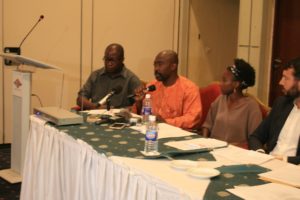
Alicante stated that’Equatorial Guinea is a crime syndicate not a nation’ and for the political scientist, ‘the country is a textbook case of autocracy where a bunch of criminals gathered together for the purpose of committing crimes.’
‘In that context’ he continued ‘in the absence of an independent judiciary or any other state institution, meaningful civil society including independent media and countervailing political process to hold the government accountable,’ such country he said has become a perfect haven for anyone like Yahya Jammeh that is trying to escape its victims.
About Jammeh’s life in Equatorial Guinea in spite of calls by people for him to be held accountable for his atrocities and to be brought together with his accomplices to justice, he said it is very unfortunate that the former Gambia dictator is living in a 7 star hotel enjoying a luxurious life in one of the seventeen opulent palaces President Todoro Obiang Nguema Mbasogo owns throughout the country “because he’s away from his victim.”
Listening to stories of some of the victims of the former president, and for the fact that his government is sheltering dictator Yahya Jammeh he said“I have to take my loyal hat off and say my country, Equatorial Guinea (EG) is definitely a complicit in the suffering of the victims and in denying justice to these citizens in the Gambia.”
In his call for justice he said injustice anywhere is a threat to justice everywhere “if we fight for justice in The Gambia that leads to justice in Equatorial Guinea and that will build a bridge to justice in Zimbabwe, Swaziland and in so many other places where African leaders are committing most barbaric acts.”
Benedict De Moerloose (Trial International) in-depth dilated on Ousman Sonko, former Minister of Interior’s case, a close associate of Jammeh who is currently detained in Switzerland.
Benedict explained that Sonko was arrested on January 28 and he’s undergoing a criminal investigation in Switzerland where he is being detained for almost nine months. Sonko, he said, is accused of crime against humanity and torture.
He said so far the former interior’s minister has made seven appeals in detention and lost all and on Friday, October 20, 2017 the Supreme Court in Swiss ruled that his assets should be confiscated.
Among the victims who narrated their ordeals under the former dictator at the press briefing included Dr Amadou Scattred Janneh; Imam Baba Leigh, Baba Hydara; Fatoumatta Sandeng; Ayeesha Jammeh; Nana Jo N’dow among others.
Things That Matter – Care with Public Funds
Dear Editor,
Let there be a module on ‘Politics’ and ‘Finance’ in Gambia’s high-school curriculum to teach young students on ‘Good-citizenship’, ‘Financial Management’, and the utility of ‘ethics’ in public life. In my view, leadership is not just about winning elections and reading from scripted speeches. It is about possessing the right dose of temperament, foresight, and the ability to effectively communicate a massage that resonate & inspire the audience, thereby acting upon it for the general good of the people. In Gambia, and Africa-wide scenarios, One may define leadership as the ‘ways and attitudes of politicians & elite with oversize egos, and the manner in which that behaviour is downsized & channelled through public life’.
The Birthday Problem – In the ‘Jammeh era’, birthday celebrations had become a mainstay of government machinery in which various departments and local government authorities were coaxed to contribute to the ‘dear-leader’s birthday parties. A cake procurement department is set up, so is the food and drinks committee, the entertainment sub-committee, plus that of the venue and sitting arrangement in order – Cheii Gambia. Daily governance thus took a back-seat with female Cabinet ministers jostling for positions amid financial ruins of tax-payer funds. On such occasions, we saw sad realities of young women & girls lured into the trap of Kanilai nightfall – I strongly recommend the Gambia Centre for Victims of Human Rights Violations and the UN crimes investigator in the country to both document rape and sex crimes and for the culprits to face justice #End-Impunity.
Unnecessary Treks and Workshops – The idea that in the Gambia ministers & senior civil servants are found criss-crossing the globe from one city to the next is extremely concerning. To add plaster to the already existing wound, government departments and agencies are constantly on the prowl for useless workshops and ‘Treks’ in luxurious hotel settings gathering per-diems in the process. This is a mystery, given that those workshops and so-called retreats could be occasioned in Ministerial boardrooms and governmental nexus around the vicinity of the capital, Banjul. I hate waste, and if the Gambia is to have any control on its finances, please, abolish unnecessary spending because every dalasi & butut count, and therefore leadership from the top matters too.
Today, ample opportunity has come to meet the Barrow-government through the many bilateral & multilateral exchanges at hand. The partnership with the European Union is paramount, who deserve much credit for refilling the nations empty coffers. The strategic understanding with Senegal, ECOWAS and AU will only grow stronger. And with its Embassy-tag firmly affixed, Banjul-Beijing ties are at their strongest; so are the long-standing ties with Turkey, Guinea Bissau, Cuba and the world. The Foreign Ministry in Banjul continue to play significant roles during this transformation pursuing policies designed on win-win beneficial gains. We can only hope that vision shall be reciprocated by friends and allies in the international community, including the United States. Given the troubled past and the many scandals & thievery of public money as dramatized at the commission in sitting, the Barrow government and civil service stream need tread extra-careful with regards to public funds #Accountability.
A success story – Tanzania: I often refer to the case of President John Magalufi, to the charging of my interlocutors. Like President Barrow, his ascension to power was unexpected against a powerful ruling elite corrupt to the core. Known as ‘the Bulldozer’ with reputation for getting things done, it was poor and ordinary Tanzanians who put their faith and voted him to pwer. Too often in Africa, exciting new leaders with radical ideas & supposedly impeccable moral credentials have started off promisingly, only to ossify into ineffective autocrats. Not him, because his first term has created a buzz of expectation that at last Tanzania has found a leader capable of awakening the ‘sleeping giant’ of East-Africa, one with huge, largely unexploited, gas and mineral resources. In his first budget, development and infrastructure spending went from 25 to 40 per cent – funded by cutting waste, extravagance — even the serving of tea and coffee in offices has been banned, and squeezing more revenue from private companies and the rich.
I strongly urge our President to befriend President Magalufi, and to seek his counsel on tackling corruption & development stories. And you could start by putting a brake on executive waste and for ministers to hold conferences at boardrooms rather than expensive hotel settings; except where occasioned by UN and EU partner agencies. This madness & Jammeh-style mismanagement must end #GambiaHasDecided. The president should cast an eye beyond Senegal look to the region and the world for new ideas & inspiration. But he has been invincible of late, perhaps, ever since assuming office. Yes, there is access to the media in terms of the State House press team, but there appears to be no personal touch with ordinary Gambians looking up to his leadership. Mr President, you have lived in London and witnessed first-hand the functionality of a true democracy. In the United Kingdom, we do not give convoys to our Ministers, and still they are expected to appear before the press & explain government policies; every day. But the President appears shielded away from one-to-one contact with the public or media houses on what his administration is up to. That is unhealthy for a democracy, further eroding public confidence!
Reflecting on Tanzania, and to the legacy of true pan-Africanists like Thomas Sankara, Kwame Nkruma, Dawda Jawara, and few others, having genuine love for country and continent, the President could start by selling all government cars, and for the vice-president and army chief to stop the nonsensical convoys blocking traffic. Only in Africa – corruption remain a cancer on society as if successive leadership never learns. I am not blaming the president per se, hence stealing public funds had been institutionalized. That does not make it right, and it takes wise & decisive leadership to recognise waste and put a stop to it. Today, the fact that callous behaviour continues in public institutions raise serious questions about competence and cruel intent on the part of certain civil servants. The government should look to success stories and development projects happening in Tanzania, and seek to implement best practices & inject efficiency. At this juncture, President Magalufi is heralded as the best head of state in Africa, whereas in Gambia’s case, questions-marks still remain as to core values, decency and oath to uphold and defend the constitution at all times in the pursuit of national interest.
Gibril Saine Twitter: @gibbysaie
Latrikunda Market Vendors Ordered To Vacate
Officials at The Kanifing Municipal Council (KMC) have ordered Dozens of vendors at the Latrikunda Market to vacate without delay.
The short notice issued by the council have ordered all structures surrounding the perimeter area of the market to vacate.
“You are ordered to vacate your canteens or kiosks within 14 days,” the notice stated.
“Failure to comply may result in court action against you,” it added.
Alagie Choi, one of the affected canteen owners said he has been selling at the market for over 30 years, he called on the new government to come to their aid.
“We are Gambians, this is unfair, we have no where else to go,” Alagie Choi said.
Choi who looked very stressed said the officials have failed the promise to return the canteens to them after work is completed, saying they were temporarily told to move to the Buffer zone without any demarcation.
He added that they were invited to a meeting last Tuesday at the municipality where they were ordered to vacate on Saturday. They complained about the short notice as it will be almost impossible to build structures within few days.
“We are not refusing to leave, we are asking them to demarcate the place where we are suppose to move,” Amadou Sowe interjected.
Sowe also complained about the short notice querying about the stockpile of goods in their canteens. He called on the government to look into their plight as they paid taxes and revenues to the authorities.
“We are breadwinners of our families. This is where we earn our livelihood,” He added.
Meanwhile, the public relation officer of the municipal council could not be reach for comments.
Why Halifa labelled “the man with the horns”
Alagi Yorro Jallow
In one of Shakespeare’s most renowned plays, Hamlet, Act III, Scene III, King Claudius lamented, “My words fly up but my thoughts remain below. Words without thoughts never go to heaven!” Halifa contributed immensely to the foundations of New Gambia.
His vision and determination will ever be a lasting impression on every facet of our national endeavor transform twenty-two years of dictatorship to a fledgling democracy.
It is due to his initiative that new Gambia now has a strong and solid base and is a major moral giant of Africa. Halifa is inspired by a durable foundation and represents a renewed initiative towards consolidating the gains of national reconstruction at this crucial stage of our national development.
From the corner of my memory’s eye I catch this movie in which a community decides to collectively hate on this Jewish guy who always wears a hat. The kids are fed a belief that the guy has horns under his hat…. what’s the name of that movie… so a generation of youngsters is growing up hating a Jew (and therefore all other Jews they’ll ever know) because they believe he has horns growing out of his skull as a sign of his inherently evil nature.
He’s the boogieman they dare not come near… darn it, what’s the name of that movie… There’s a funny scene where two of the kids who know the truth decide to lure other kids to the Jewish guy’s home so they can see his horns when he takes off his hat. The knowing kids laugh themselves silly when the other gullible kids take off in terror upon seeing the man with the horns approaching… what the devil’s horn’s the name of– forget it.
For now, “the man with the horns” is the real-life movie playing out in the Gambian politics especially in diaspora among a group that believes the man from the shores of Sere-kunda Central is indeed Mephistophelian in nature. He’s the Gambia’s guy with the hat that hides something diabolical, and he is to be greatly feared by the godly and spiritually favored group that has decided there’s only one man anointed to lead the country.
I do not come to judge your faith or to question the veracity of such bizarre claims – heck, I don’t know if the man is hiding a chicken claw that can run all by itself under his hat – but as a human being who refuses to stay silent in the face of crimes against humanity, I will point to the chilling markings of a dangerous collective mindset clothed in holiness and humility.
Somewhere in this political madness that has affected diaspora and Gambian politics, there’s a light, and I know that light well because I have bathed often in its unpretentious generosity. At a time like this, we must dare invade each other’s exclusive spaces even when we’re not welcome, talk to each other long enough, heart to heart, across the divide, however difficult the conversations, and only then will we begin to find each other’s shared humanity.
Halifa will never repent like King Claudius who killed for him to ascend to power. He tried to kneel in prayer, but couldn’t feel any sense of comfort, mercy and Claudius soon realized that because he had no intention of confessing the crime or changing his earthly status, his words were empty and meaningless. Consequently, the weight of his sin kept him bound to earth, with no hope of touching heaven.
By Alagi Yorro
“Leave The Government Alone To Do Its Job”
What does this statement mean? Who are those who make this claim? What is their motive?
Nowadays it is common to hear some Gambians claim that people should leave the Barrow Government alone to do their job because we elected the government. When you raise an issue or concern, they tell you that you cannot speak about that because you are not an expert in that area. Some would even go to the ludicrous height of questioning what you did during the past 22 brutal years. Some even claim that we cannot know better than the government because the government is led by knowledgeable people. Some entertained the meaningless idea that in fact Barrow inherited a 22-year brutal regime. There are others that even give the impression that the government and Pres. Barrow cannot and will not do anything wrong!
But we all know that experts make mistakes. Leaders make mistakes. Governments make mistakes. The evidence of that is right now unfolding before us at the Janneh Commission. Therefore why are we thinking that Barrow and his government cannot make a mistake? Are we trying to say that Barrow is God and therefore knows everything and cannot make a mistake? Are we trying to say that all the people who work in our public service and security sector are infallible human beings? In which society have we seen citizens “leave the government alone to do its job”? In fact what does that idea mean in the first place?
Jawara was the first president of the Gambia, yet we know that he made lot of mistakes, deliberately or not. After 30 years in power he left the Gambia poor with weak institutions and poor social services with widespread corruption. During his tenure many Gambians joined opposition parties and other groups to challenge Jawara in the way he managed the country.
At that time people did not say let us leave Jawara alone because he knows everything and he can do everything. Instead many Gambians stood up by raising issues and concerns. No one said let us give time or space to Jawara because he inherited a government from the colonialists who were ruling the Gambia since 1889. We did not qualify anyone as an expert before they could speak their mind.
When Yaya Jammeh overthrew the Jawara regime, most Gambians welcomed the coup because they considered it at least a necessary evil to break the long and inefficient rule of the PPP. By then most Gambians expressed goodwill towards Jammeh wishing him to succeed. As citizens we wanted the best for country and ourselves and therefore people engaged the junta in various ways until we got out of the transition period and ushered in the Second Republic.
But since assuming power, Jammeh illegally personalized the entire state and all of its institutions and resources. The current Janneh Commission is now showing how Jammeh had circumvented, damaged and ignored all laws, processes, rules and procedures just to enrich and entrench himself. He had engaged in all forms of human rights abuses including subjecting Gambians to health hazards in his fake treatment programs for HIV/AIDS and other diseases. He mismanaged the entire public sector and suppressed both the parliament and the courts to serve only his whims and caprices. Yet he was a president who was leading a government!
While indeed many Gambians aided and abetted him in various ways, there were also very many Gambians who stood up to him in various ways and means. We did not say at that time that we should give Jammeh time and space because he inherited a corrupt government of 30 years. We did not say only experts should speak. We all spoke up in our various ways. Many took to online radios, Whatsapp groups and other social media platforms to vent out their issues and concerns. Most of us in opposition parties and other civil and armed groups opposed to Jammeh did not condemn each other for not being experts. We did not say let us leave Jammeh alone because he knows everything and he can do everything. Rather we exposed his mistakes and condemned him.
Therefore when we got to 2017 with a new president and government, one would imagine that all Gambians should learn from the Jawara and Jammeh experiences. From that history it should tell us that it is not necessarily true that an elected president or a government will always be honest, open and effective. There is evidence around the world that in many cases presidents and governments get corrupt deliberately and underperform and mismanage public resources. The reason why there is poverty and conflicts and abuse in any society is because leaders and governments fail to do the right thing. Not that they do not know their job but rather they deliberately abuse their office and flout the rules.
Thus if the Gambia gets to this level, it is indeed shocking for anyone to therefore conclude that Barrow and his Cabinet know everything and they will do things right. Yes, we expect them to know and do the right thing, but it is also true that they might not know and do the right all the time. Hence it is necessary that all citizens voice out their issues and concerns. We can disagree with each other’s opinions, but we must not suppress each other on the basis that one is not an expert or that the government knows what it must do or even ask that we give Barrow chance or time.
In democratic governance, there is nothing like giving time or chance to a president. What is chance? How much time should you give to an elected president in a term of five years? In politics, presidents or politicians are not saints or angels. History has shown that corruption and violations in any country is caused by presidents and politicians. It is presidents and politicians who are the leaders of society entrusted with public institutions and resources to manage. Yet in many cases, these leaders mismanage, plunder and abuse. Therefore why should we think that Barrow is different from Tony Blair or Yaya Jammeh or Dawda Jawara or Donald Trump or Emanuel Macron or Macky Sall or Mobutu or Jacob Zuma or Paul Kagame or Xi Jinping or Ellen Johnson Sirleaf? They are or were all presidents and politicians and leaders.
God Bless The Gambia.
Madi Jobarteh
Rejoinder to the caption: “The next change must be a system change” – Halifa’s stirring London speech
PRESS RELEASE
OFFICE OF THE PRESIDENT
The richness of leadership is the ability to accommodate, listen and provide advice and guidance to the people who entrust you with the leadership. While Sulayman Bah UK would like to present Honourable Halifa Sallah’s speech to his audience in UK as incredible, it is important to move beyond political canvassing and polemics to provide facts on the realities of the country we all love.
Kindly allow me to shed light on the issues Sulayman Bah UK attributed to Honourable Sallah regarding the situation since December 2016.
It is no secret that in December 2016, over 200,000 Gambians, took practical steps to vote in Adama Barrow as leader of the Coalition. Hundreds of thousands more invested their energy, time and financial resources to ensure we give The Gambia a new beginning. These are people committed to uplift the lives of Gambians with dignity and respect. While the levels of sacrifices differ from one person or group to the other, all the sacrifices must be commended and respected. As a reminder, in case some forgot, the Coalition government until the time of this publication is made of the following:
1. United Democratic Party
2. National Reconciliation Party
3. People Democratic Party for Independent and Socialism
4. The People Progressive party
5. Gambia Moral Congress
6. Gambia People Democratic Party
7. National Convention Party
8. Dr. Isatou Touray -Independent Presidential Aspirant
Therefore all those who were committed to the change, should continue to guard, guide and nurture it.
Government requires teamwork where no one person alone can make a difference but a combination of efforts to change a system. The fact that it was reported in FOROYAA that Honourable Halifa stated that “…Despite defeating Jammeh after 22 years of self-perpetuation …from the Coalition government, nothing seems to have improved the living standard of ordinary Gambians…” needs reflection.
This remark by Hon. Halifa Sallah insinuating that nothing has changed to improve the lives of the people and comparing this government to the former dictatorial regime is a distortion of facts. This is unfair given the efforts that are already in place by this government with the support of Gambians to move away from the difficult era of the former regime.
It is therefore important to take a good lens to capture those efforts and what has changed since “The Gambia is in the hands of its citizens” to see how the Coalition government is not “reminiscent of the APRC government days”.
The first expression of change that is not “reminiscent of the APRC government days” is that citizens found their voice. They are now free to express their opinion without fear or favour and can go home and not fear that at 3:00 a.m, someone in the name of the government would drag them out of their house and deny their family the right to even know why they are being taken away.
Since the Coalition Government took over, the vehicular traffic at the Gambia Ports Authority bringing basic commodities among others has exceeded the current capacity of the Ports to handle. This increase in economic activity is a result of the conducive business environment created by this government leading to the stability of prices of basic commodities which are in fact generally going down. It is also important to know that government has already taken the decision for the port to operate 24 hours creating more employment and improving timely service delivery.
Furthermore, Barrow government has reduced the price of fuel three times in less than a year with its positive rippling effects on commodity prices and availability across the country.
The Gambia has moved from regional and global isolation to a state of recognition and respect; and a new dawn of hope for its citizens. Traditional partners have regained confidence to engage the Barrow government in mutual respect and support to garner the desires and hopes of the citizens. This is not symptomatic of “poor policies and poor leadership.”
We now live in a connected and interdependent world where governments/countries collaborate and work in partnership to support each other in the interest of mutual sustainable development. As part of international cooperation, countries acquire grants, loans and other forms of support including foreign direct investment to help grow their economies. No country relies solely on taxation to move its development agenda and to put it bluntly no nation is self-sufficient. The Gambia is no exception and does not accrue enough tax to be able to execute all its development aspirations.
Presenting its policies to partners both within and outside for support as well as fiscal discipline have improved the foreign exchange reserve from its precarious state of less than one month import cover with a debt burden of 120% beyond the recommended 70% debt of any country to 4 months. It is unfortunate that this is interpreted as a nation relying on “charity” for its development.
The performances of some State Owned Enterprises –such as NAWEC, GNPC and GAMTEL/GAMCEL, were low and government had to step in to settle their external obligations, thus putting undue pressure on the Gambian Dalasi and the reserve level.
It is clear that there needs to be a structural change to the budget and prioritization of growth enhancing expenditure such as development projects. Without these measures increasing salaries will be extremely unwise at this time.
In order to improve the economic environment, the Coalition government is engaged in initiating difficult measures to deal with the numerous challenges resulting from poor economic governance of the former regime. These include but are not limited to Public sector restructuring and rationalization plan, implementation of a government vehicle policy and business travel policies.
The change of government has boosted youth confidence and self esteem. The new administration’s policy on youth is to enlighten them on their rights and empower youths to take responsibility to initiate, innovate and contribute to nation building and most are not relying on government to build their lives. The first project signed by the new Government is centered around youth empowerment through funding from the European Union (EU). The 11million Euro Project focuses on youth employment creation in the areas of agribusiness, ICT and Tourism aiming to provide high quality skills training for potential youth entrepreneurs and startups. This project includes a mini grant and loan scheme for youth Small and Medium Enterprises (SMEs). To effectively respond to the needs of young people not just as a cross cutting issue in our development frameworks as it used to exist in the Gambia, a whole component on youth empowerment and development has been incorporated in the National Development Plan (NDP). Similarly, a specific pillar on youth has also been incorporated in the ongoing development of The Gambia National Agriculture Investment Plan (GNAIP) 2 to comprehensively address the issues of youth in The Gambia.
There has also been an increased space for youth political participation in the new dispensation. The Gambia can today be proud of the democratic space that guarantees freedom of expression. During the last National Assembly Election young people of The Gambia worked with all stakeholders to improve awareness on youth engagement and to increase their number in the political space through the #NotTooYoungToRun campaign. The Gambia is today hailed as having one of the youngest elected members in the National Assembly in the sub region.
This cannot be “reminiscent of APRC government days” when every youth’s desire was to leave the country. Gambians in exile are returning home to contribute to nation building and to nurture the change.
On agriculture, the Coalition government encourages and empowers farmers to work on their own farms to “reap what they sow” and ordinary citizens are not forced to spend valuable time on the President’s farm. It has provided farmers $25 million worth of fertilizer and seeds. This definitely is not “reminiscent of APRC government days”.
On waste management, the new government encourages people to use their conscience and commitment to environment sanitation to clean the environment and manage the domestic waste it produces and not force people and businesses to stop all activities to clean their environment and at the end of the day does not have the mechanism to collect and dispose the waste. The Coalition government has improved daily management of waste at the dump site at Bakoteh and has further committed to waste management through a Public Private Partnership which seeks to provide a comprehensive solution to waste management in The Gambia.
The Coalition government inherited bad institutional policies and practices. To change such a system will require having knowledge of the depth of destruction in our institutions, policies to institutionalize best practices and committed citizens to execute the plan to implement the policies. It requires re-orientation of the workforce and commitment to the nation and not an individual. It is misplaced to state a comparison and conclude that the new regime is “reminiscent of APRC government days”.
The APRC Government had the opportunity to amend the Constitution removing the barriers to enable eligible Gambians in the Diaspora to vote or be voted for. Did they do it? Of course no. It is not the new government that deprived the Diaspora from voting and contesting to be President, National Assembly Member or Councilor. In fact the new government is in the process of drafting a new Constitution that will accommodate all Gambians to take part in the political, economic and social life of the country. The new government recorded the highest number of contestants in the National Assembly election, a demonstration of a vibrant democracy where people feel that they own the nation. This cannot be “reminiscent of APRC government days”, when if it was known that citizens aspired for political positions, their lives were in danger and could result to torture, maiming and even death of citizens.
The judiciary has been “Gambianised” by encouraging our legal luminaries to serve the country with dedication to justice with the appointment of a Gambian as Chief Justice. Gender representation was also given consideration with the appointment of numerous female Judges at the superior courts.
The Coalition government is working to ensure that citizens recognize the damage that has been done to the nation and its organs of management and governance. No sincere person will expect the new government to increase government pay. Instead the government has to further cut on its expenditure. For instance the office of the President had cut expenditure by 75% since the new administration came to power.
The Coalition government under the leadership of President Adama Barrow empowers all citizens to work together to build a country we can all be proud of. That is why Halifa Sallah was offered the opportunity to bring in his “policies” that will not subject the government to rely on others to develop the country. He rejected to take a position that would give him the responsibility to get the nation out of the situation in which it relies on others to give it charity. It is easier for Hon. Sallah to criticize than take responsibility where he can be accountable to the people.
“It is easier to criticize than take responsibility”, Barrow tells Sallah
The Gambian leader Adama Barrow has reacted to a comment by his coalition ally, Halifa Sallah, who reportedly told his London meeting that the country is yet to have a system change after the defeat of the autocratic ruler Yahya Jammeh.
Barrow was back by seven opposition parties and an independent candidate in an election that saw him defeating Yahya Jammeh.
This is the first response that comes from the presidency as regards to criticisms directed at the government by Sallah, who is currently a National Assembly member for Serrekunda East.
Below is the response from the presidency:

President Adama Barrow (right) and Halifa Sallah (left).
Rejoinder to the caption: “The next change must be a system change” –
Halifa’s stirring London speech
The richness of leadership is the ability to accommodate, listen and provide advice and guidance to the people who entrust you with the leadership. While Sulayman Bah UK would like to present Honourable Halifa Sallah’s speech to his audience in UK as incredible, it is important to move beyond political canvassing and polemics to provide facts on the realities of the country we all love.
Kindly allow me to shed light on the issues Sulayman Bah UK attributed to Honourable Sallah regarding the situation since December 2016.
It is no secret that in December 2016, over 200,000 Gambians, took practical steps to vote in Adama Barrow as leader of the Coalition. Hundreds of thousands more invested their energy, time and financial resources to ensure we give The Gambia a new beginning. These are people committed to uplift the lives of Gambians with dignity and respect. While the levels of sacrifices differ from one person or group to the other, all the sacrifices must be commended and respected. As a reminder, in case some forgot, the Coalition government until the time of this publication is made of the following:
United Democratic Party
National Reconciliation Party
People Democratic Party for Independent and Socialism
The People Progressive party
Gambia Moral Congress
Gambia People Democratic Party
National Convention Party
Dr. Isatou Touray -Independent Presidential Aspirant
Therefore all those who were committed to the change, should continue to guard, guide and nurture it.
Government requires teamwork where no one person alone can make a difference but a combination of efforts to change a system. The fact that it was reported in FOROYAA that Honourable Halifa stated that “…Despite defeating Jammeh after 22 years of self-perpetuation …from the Coalition government, nothing seems to have improved the living standard of ordinary Gambians…” needs reflection.
This remark by Hon. Halifa Sallah insinuating that nothing has changed to improve the lives of the people and comparing this government to the former dictatorial regime is a distortion of facts. This is unfair given the efforts that are already in place by this government with the support of Gambians to move away from the difficult era of the former regime.
It is therefore important to take a good lens to capture those efforts and what has changed since “The Gambia is in the hands of its citizens” to see how the Coalition government is not “reminiscent of the APRC government days”.
The first expression of change that is not “reminiscent of the APRC government days” is that citizens found their voice. They are now free to express their opinion without fear or favour and can go home and not fear that at 3:00 a.m, someone in the name of the government would drag them out of their house and deny their family the right to even know why they are being taken away.
Since the Coalition Government took over, the vehicular traffic at the Gambia Ports Authority bringing basic commodities among others has exceeded the current capacity of the Ports to handle. This increase in economic activity is a result of the conducive business environment created by this government leading to the stability of prices of basic commodities which are in fact generally going down. It is also important to know that government has already taken the decision for the port to operate 24 hours creating more employment and improving timely service delivery.
Furthermore, Barrow government has reduced the price of fuel three times in less than a year with its positive rippling effects on commodity prices and availability across the country.
The Gambia has moved from regional and global isolation to a state of recognition and respect; and a new dawn of hope for its citizens. Traditional partners have regained confidence to engage the Barrow government in mutual respect and support to garner the desires and hopes of the citizens. This is not symptomatic of “poor policies and poor leadership.”
We now live in a connected and interdependent world where governments/countries collaborate and work in partnership to support each other in the interest of mutual sustainable development. As part of international cooperation, countries acquire grants, loans and other forms of support including foreign direct investment to help grow their economies. No country relies solely on taxation to move its development agenda and to put it bluntly no nation is self-sufficient. The Gambia is no exception and does not accrue enough tax to be able to execute all its development aspirations.
Presenting its policies to partners both within and outside for support as well as fiscal discipline have improved the foreign exchange reserve from its precarious state of less than one month import cover with a debt burden of 120% beyond the recommended 70% debt of any country to 4 months. It is unfortunate that this is interpreted as a nation relying on “charity” for its development.
The performances of some State Owned Enterprises –such as NAWEC, GNPC and GAMTEL/GAMCEL, were low and government had to step in to settle their external obligations, thus putting undue pressure on the Gambian Dalasi and the reserve level.
It is clear that there needs to be a structural change to the budget and prioritization of growth enhancing expenditure such as development projects. Without these measures increasing salaries will be extremely unwise at this time.
In order to improve the economic environment, the Coalition government is engaged in initiating difficult measures to deal with the numerous challenges resulting from poor economic governance of the former regime. These include but are not limited to Public sector restructuring and rationalization plan, implementation of a government vehicle policy and business travel policies.
The change of government has boosted youth confidence and self esteem. The new administration’s policy on youth is to enlighten them on their rights and empower youths to take responsibility to initiate, innovate and contribute to nation building and most are not relying on government to build their lives. The first project signed by the new Government is centered around youth empowerment through funding from the European Union (EU).
The 11million Euro Project focuses on youth employment creation in the areas of agribusiness, ICT and Tourism aiming to provide high quality skills training for potential youth entrepreneurs and startups. This project includes a mini grant and loan scheme for youth Small and Medium Enterprises (SMEs). To effectively respond to the needs of young people not just as a cross cutting issue in our development frameworks as it used to exist in the Gambia, a whole component on youth empowerment and development has been incorporated in the National Development Plan (NDP). Similarly, a specific pillar on youth has also been incorporated in the ongoing development of The Gambia National Agriculture Investment Plan (GNAIP) 2 to comprehensively address the issues of youth in The Gambia.
There has also been an increased space for youth political participation in the new dispensation. The Gambia can today be proud of the democratic space that guarantees freedom of expression. During the last National Assembly Election young people of The Gambia worked with all stakeholders to improve awareness on youth engagement and to increase their number in the political space through the #NotTooYoungToRun campaign. The Gambia is today hailed as having one of the youngest elected members in the National Assembly in the sub region.
This cannot be “reminiscent of APRC government days” when every youth’s desire was to leave the country. Gambians in exile are returning home to contribute to nation building and to nurture the change.
On agriculture, the Coalition government encourages and empowers farmers to work on their own farms to “reap what they sow” and ordinary citizens are not forced to spend valuable time on the President’s farm. It has provided farmers $25 million worth of fertilizer and seeds. This definitely is not “reminiscent of APRC government days”.
On waste management, the new government encourages people to use their conscience and commitment to environment sanitation to clean the environment and manage the domestic waste it produces and not force people and businesses to stop all activities to clean their environment and at the end of the day does not have the mechanism to collect and dispose the waste. The Coalition government has improved daily management of waste at the dump site at Bakoteh and has further committed to waste management through a Public Private Partnership which seeks to provide a comprehensive solution to waste management in The Gambia.
The Coalition government inherited bad institutional policies and practices. To change such a system will require having knowledge of the depth of destruction in our institutions, policies to institutionalize best practices and committed citizens to execute the plan to implement the policies. It requires re-orientation of the workforce and commitment to the nation and not an individual. It is misplaced to state a comparison and conclude that the new regime is “reminiscent of APRC government days”.
The APRC Government had the opportunity to amend the Constitution removing the barriers to enable eligible Gambians in the Diaspora to vote or be voted for. Did they do it? Of course no. It is not the new government that deprived the Diaspora from voting and contesting to be President, National Assembly Member or Councilor. In fact the new government is in the process of drafting a new Constitution that will accommodate all Gambians to take part in the political, economic and social life of the country. The new government recorded the highest number of contestants in the National Assembly election, a demonstration of a vibrant democracy where people feel that they own the nation. This cannot be “reminiscent of APRC government days”, when if it was known that citizens aspired for political positions, their lives were in danger and could result to torture, maiming and even death of citizens.
The judiciary has been “Gambianised” by encouraging our legal luminaries to serve the country with dedication to justice with the appointment of a Gambian as Chief Justice. Gender representation was also given consideration with the appointment of numerous female Judges at the superior courts.
The Coalition government is working to ensure that citizens recognize the damage that has been done to the nation and its organs of management and governance. No sincere person will expect the new government to increase government pay. Instead the government has to further cut on its expenditure. For instance the office of the President had cut expenditure by 75% since the new administration came to power.
The Coalition government under the leadership of President Adama Barrow empowers all citizens to work together to build a country we can all be proud of. That is why Halifa Sallah was offered the opportunity to bring in his “policies” that will not subject the government to rely on others to develop the country. He rejected to take a position that would give him the responsibility to get the nation out of the situation in which it relies on others to give it charity. It is easier for Hon. Sallah to criticize than take responsibility where he can be accountable to the people.
Source: The Torch
Ansu And Gibril Badjie Granted Bail But…
By Omar Wally
A family source has informed The Fatu Network that Gibril Badjie and Ansu Badjie, supporters of former President, Yahya Jammeh’s Alliance For Patriotic Reorientation and Construction Party (APRC) who were under police custody have been granted bail.
Gibril was arrested in Brikama while Ansu was arrested in Sabi village, Upper River Region. Their arrest was in connection with a WhatsApp group they created ‘One Voice’ on which they recorded and shared voice messages around.
They are accused of using WhatsApp to castigate and insult people and didn’t stop at one person but went further and insulted certain political parties and individuals.
When contacted Assistant Superintendent Foday Conta, Police PRO, confirmed the release of the two men on bail. However, he said they are charged with prohibition of conduct and they have been asked by the police to be reporting to Police Headquarters in Banjul.

